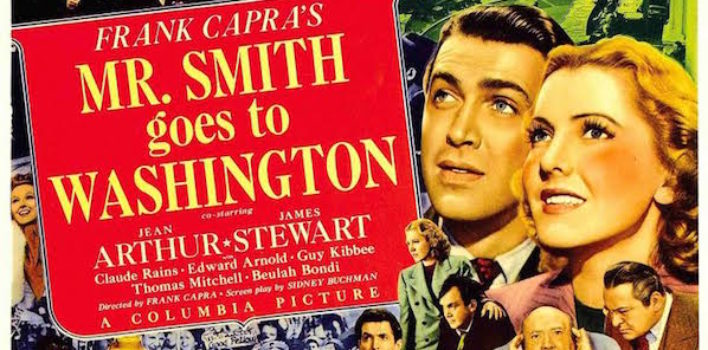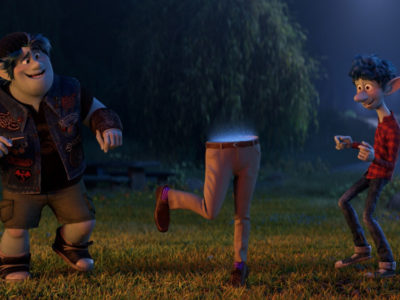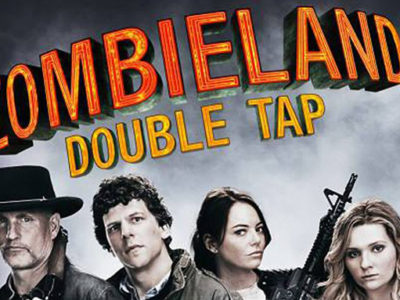Reviewing the Classics| Mr. Smith Goes to Washington
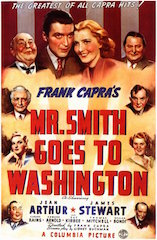 I chose this film as my next classics piece long before the political climate of our country reached critical mass, and now it’s clear that it is a perfect choice. Frank Capra’s gem was released in cinemas at the cusp of the 1930s into 1940s. It was a time when Europe was falling apart and America had not yet entered the second World War. It had been years since I had seen this film, but as I viewed it again for this post, I was awestruck by how timely and timeless it truly is.
I chose this film as my next classics piece long before the political climate of our country reached critical mass, and now it’s clear that it is a perfect choice. Frank Capra’s gem was released in cinemas at the cusp of the 1930s into 1940s. It was a time when Europe was falling apart and America had not yet entered the second World War. It had been years since I had seen this film, but as I viewed it again for this post, I was awestruck by how timely and timeless it truly is.
When the senator of an unnamed western state dies, political bosses are in a scramble to replace him. His death is inconvenient for them, as they were just about to pass a bill that would enable them to build a dam in that state. This would help the politicians and businessmen pad their wallets and their egos, but not without causing socio-economic distress of epic proportions and destruction of nature. Knowing they need a “stooge” in order to continue on with their corrupt plans, they select Jefferson Smith (Jimmy Stewart) a hero of Boy Ranger clubs, nature advocate, and a passionate American.
They never mention the name of his state, and I believe that’s intentional. The writers want the audience to feel that he speaks for them and that his state could be any one of our states. This open-ended, personal touch makes the viewer more involved with the story.
They assume Jefferson will be an easy pushover for their agenda, and initially they are right. He’s a simple man, a poster child for the common American. Though his father was a politician and died for his morals, Jefferson knows very little of the ways of Washington. He is wholly unspoiled by the crooked nature of politics. Watching and listening to the interactions of the other politicians is no different than what we encounter today. Career politicians become embedded in their power and corruption. My husband and I shared a chuckle watching all the political scenes because nothing has changed. Even the commentary on the media twisting everything and taking quotes or photos out of context was spot on. The same issues and unethical practices that happen in this movie are still happening.
“As a dog returns to its vomit, so fools repeat their folly.” – Proverbs 26:11 (NIV)
That’s not to say all hope is lost because there are those who will not let themselves be stained by the follies of others. Jefferson is indeed very ill-equipped for his task, but it is his heart and passion that ultimately make him a most qualified leader and a game changer. His simplicity magnifies the many problems with the system.
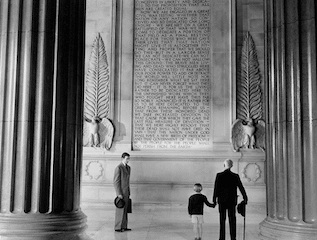 One of my favorite things about this film is the character Clarissa Saunders (Jean Arthur), more commonly referred to as just ‘Saunders,” and her relationship with Jefferson. She begins as his secretary and is pretty judgmental about him at first. She equates being his secretary to babysitting. She is a hard-working woman who carved her own way in life. She’s sharp and intelligent, and she has the know-how and sensibilities to help Jefferson navigate the mire that is Washington D.C. Her character is pretty ahead of her time in terms of independence and respect.
One of my favorite things about this film is the character Clarissa Saunders (Jean Arthur), more commonly referred to as just ‘Saunders,” and her relationship with Jefferson. She begins as his secretary and is pretty judgmental about him at first. She equates being his secretary to babysitting. She is a hard-working woman who carved her own way in life. She’s sharp and intelligent, and she has the know-how and sensibilities to help Jefferson navigate the mire that is Washington D.C. Her character is pretty ahead of her time in terms of independence and respect.
Additionally, it’s wonderful that Jefferson points out how smart and capable she is and exhorts her for it. Her mind is changed about him when she hears him speak about his goal for the youth of the nation…
Jefferson Smith: “You see, you see, boys forget what their country means by just reading ‘the land of the free’ in history books. And they get to be men – they forget even more. Liberty’s too precious a thing to be buried in books, Miss Saunders. Men should hold it up in front of them every single day of their lives and say: I’m free to think and to speak. My ancestors couldn’t. I can. And my children will.”
Jefferson is an idealist and a visionary. He can see his goals at their completion as if they were already there. Saunders is practical and detail-oriented. She points out the many steps he will have to take to make his vision a reality. Together, they are able to come up with a bill to authorize a federal government loan to buy land in his home state for a national boys’ camp. This loan would be paid back by young boys themselves, encouraging them to communally make this place their own.
The catch? It’s the same patch of land intended for the dam, Willett Creek.
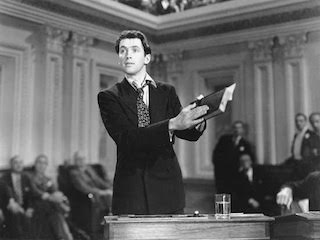 Naturally, his opponents won’t stand for this. Even his friend and fellow senator Joseph Paine betrays him and feeds him to the dogs. Jefferson sees first-hand the hideous side of politics and has a breaking moment of defeat. Saunders tells him he’s too good and decent to be here and refers to him in one scene as “Daniel in the Lions Den.” In the hurtful wake of the betrayal, he falls apart and loses faith in his long-held convictions. I think this is something we all can relate to. This world is so rotten at times that we find ourselves wondering, what’s the point? How can anyone fight for good in such a dark world? Why bother upholding virtue when vice seems to win so many of our battles?
Naturally, his opponents won’t stand for this. Even his friend and fellow senator Joseph Paine betrays him and feeds him to the dogs. Jefferson sees first-hand the hideous side of politics and has a breaking moment of defeat. Saunders tells him he’s too good and decent to be here and refers to him in one scene as “Daniel in the Lions Den.” In the hurtful wake of the betrayal, he falls apart and loses faith in his long-held convictions. I think this is something we all can relate to. This world is so rotten at times that we find ourselves wondering, what’s the point? How can anyone fight for good in such a dark world? Why bother upholding virtue when vice seems to win so many of our battles?
At the feet of the Lincoln memorial, Saunders comes to him to show her support and shares an idea so impossible, it just might work. A filibuster:
Filibuster
noun
- U.S. Politics. The use of irregular or obstructive tactics by a member of a legislative assembly to prevent the adoption of a measure generally favored or to force a decision against the will of the majority.
- An exceptionally long speech, as one lasting for a day or days, or a series of such speeches to accomplish this purpose.
- A member of a legislature who makes such a speech.
The filibuster is the climax of the movie, which includes some of the best monolog speeches in any film and an outstanding performance from Jimmy Stewart. This scene is the set-piece of the film, why people went to see it, and you are going to have to do just that if you want to know how it ends.
Jefferson Smith is a character for the ages, an everyman’s champion. I know as a nation and as a people, we probably feel similar to Jefferson as he fell broken at Lincoln’s feet. This film reminds us what “the point” really is and why we must fight for the lost causes. As Jefferson says, lost causes are the only ones worth fighting for, and all for one plain, simple rule: Love thy neighbor.


